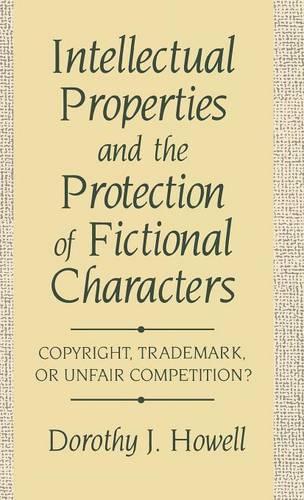
Intellectual Properties and the Protection of Fictional Characters: Copyright, Trademark, or Unfair Competition
(Hardback)
Publishing Details
Intellectual Properties and the Protection of Fictional Characters: Copyright, Trademark, or Unfair Competition
By (Author) Dorothy J. Howell
Bloomsbury Publishing PLC
Praeger Publishers Inc
30th July 1990
United States
Classifications
Tertiary Education
Non Fiction
Company law
347.30648
Physical Properties
Hardback
224
Width 140mm, Height 216mm
454g
Description
In this pioneering volume, Howell addresses the extent to which fictional characters are legally recognized and protected as intellectual property. Through a judicious selection of cases chosen for their bearing on the popular arts, the author reviews the basic legal principles involved--copyright, trademark, unfair competition, and contract law--and analyzes their applications to fictional characters. In addition to tracing the evolution of the law relating to the protection of fictional characters, Howell explores the feasibility of isolating characters and protecting them via stringent copyright and/or trademark laws, addresses character merchandising and the associated legal issues, and suggests legal reforms aimed at protecting the creator. Detailed case information serves both to illustrate the legal principles and actions discussed and to stand as a model for the proprietors of future characters. Divided into two major sections, the volume begins by offering a comprehensive introduction to intellectual property law. Specific topics addressed include basic concepts of property, statutory protection of intellectual property, elements of an infringement action, defenses to copyright infringement, unfair competition, and the application of trademark principles to literary properties. In the second section, Howell analyzes the extent to which the fictional character is legally regarded as intellectual property. She reviews situations in which copyright and trademark law have been invoked to protect the creator of a fictional character, examines cases involving such well-known characters as the Lone Ranger, Superman, and the crew of the Starship Enterprise, and presents an extended analysis of the case of Tarzan. Finally, Howell considers whether right of publicity and merchandising offer additional protection for fictional characters. In the concluding chapter, she offers an analysis of copyright decisions and a proposal for their reconciliation. Both practicing attorneys and students of entertainment law will find Howell's work an important contribution to the professional literature.
Reviews
Professor Howell furnishes a valuable classification to aid in analysis of the case law and a formula for reconciling the apparently inconsistent judicial decisions. She has attained masterful success in producing an interesting and well-written work that will be of untold value to the lawyer advising her author-client and to the law researcher seeking to unravel the tangled web of legal protection for fictional characters. The book has an excellent index, complete tables of cases and fine lists of up-to-date primary and secondary sources.-Law Books In Review
"Professor Howell furnishes a valuable classification to aid in analysis of the case law and a formula for reconciling the apparently inconsistent judicial decisions. She has attained masterful success in producing an interesting and well-written work that will be of untold value to the lawyer advising her author-client and to the law researcher seeking to unravel the tangled web of legal protection for fictional characters. The book has an excellent index, complete tables of cases and fine lists of up-to-date primary and secondary sources."-Law Books In Review
Author Bio
DOROTHY J. HOWELL, currently an adjunct visiting professor at Vermont Law School and a visiting professor at Franklin Pierce Law School, is a freelance counsel whose areas of special interest include intellectual property and environmental law. The subject of legal protection for fictional characters is a specialty of Professor Howell's, as she is the author of several novels as well as scholarly materials for a variety of professional audiences.
